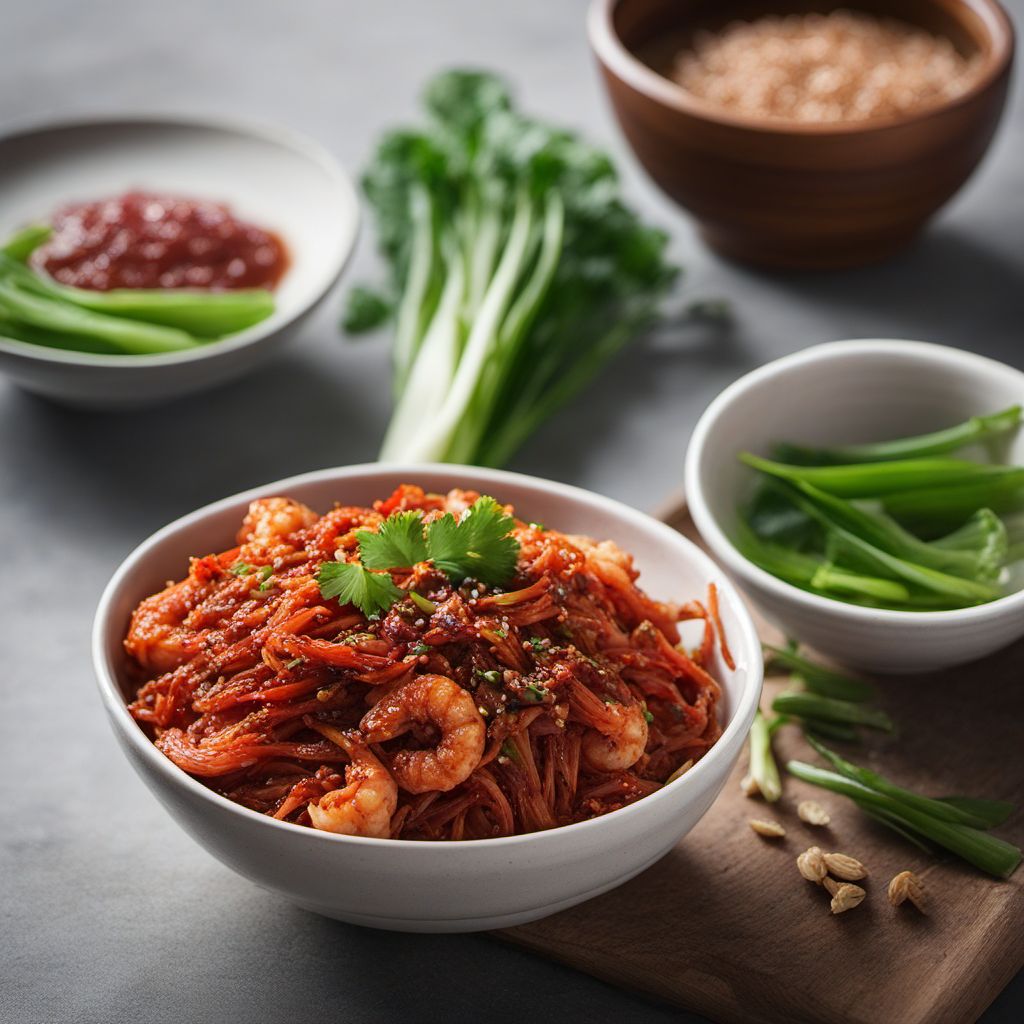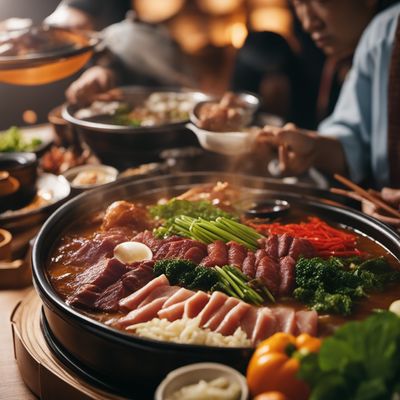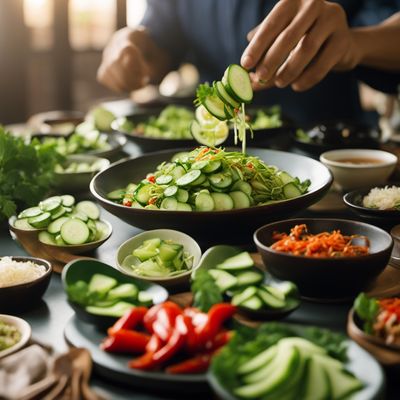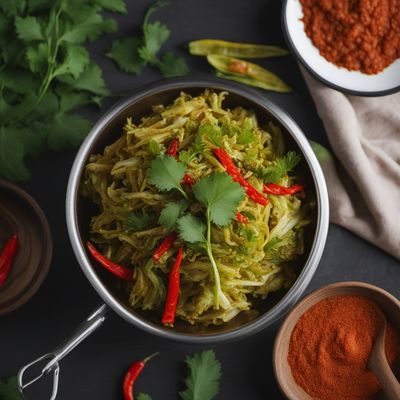
Recipe
Homemade Spicy Cabbage Kimchi
Fiery Fermented Delight: Homemade Spicy Cabbage Kimchi
4.7 out of 5
Indulge in the vibrant flavors of Korean cuisine with this homemade spicy cabbage kimchi recipe. Bursting with spicy, tangy, and umami flavors, this traditional Korean dish is a staple in Korean households and a perfect accompaniment to any meal.
Metadata
Preparation time
30 minutes
Cooking time
N/A
Total time
2-5 days (including fermentation time)
Yields
4 servings
Preparation difficulty
Medium
Suitable for
Vegetarian, Pescatarian, Gluten-free, Dairy-free, Low calorie
Allergens
Fish, Shellfish
Not suitable for
Vegan, Nut-free, Shellfish allergy, Soy-free, Paleo
Ingredients
-
1 large Napa cabbage (about 2 pounds / 900g) 1 large Napa cabbage (about 2 pounds / 900g)
-
1/4 cup (60ml) sea salt 1/4 cup (60ml) sea salt
-
1 tablespoon (15ml) fish sauce 1 tablespoon (15ml) fish sauce
-
1 tablespoon (15ml) shrimp paste 1 tablespoon (15ml) shrimp paste
-
3 tablespoons (45ml) Korean chili flakes (gochugaru) 3 tablespoons (45ml) Korean chili flakes (gochugaru)
-
4 cloves garlic, minced 4 cloves garlic, minced
-
1 tablespoon (15ml) grated ginger 1 tablespoon (15ml) grated ginger
-
2 green onions, thinly sliced 2 green onions, thinly sliced
-
1 tablespoon (15ml) sugar 1 tablespoon (15ml) sugar
-
1 teaspoon (5ml) sesame oil 1 teaspoon (5ml) sesame oil
Nutrition
- Calories (kcal / KJ): 45 kcal / 188 KJ
- Fat (total, saturated): 1g, 0g
- Carbohydrates (total, sugars): 8g, 4g
- Protein: 2g
- Fiber: 3g
- Salt: 2g
Preparation
-
1.Cut the Napa cabbage into quarters lengthwise and remove the core. Chop the cabbage into bite-sized pieces.
-
2.In a large bowl, dissolve the sea salt in water. Soak the cabbage in the saltwater for 2 hours, flipping occasionally.
-
3.Rinse the cabbage thoroughly under cold water to remove excess salt. Drain well and set aside.
-
4.In a separate bowl, combine the fish sauce, shrimp paste, Korean chili flakes, minced garlic, grated ginger, sliced green onions, sugar, and sesame oil. Mix well to form a paste.
-
5.Using gloves, coat each cabbage piece with the paste, ensuring even distribution.
-
6.Transfer the coated cabbage into a clean glass jar, pressing down firmly to remove any air pockets.
-
7.Leave about 1 inch (2.5cm) of headspace in the jar and seal it tightly.
-
8.Allow the kimchi to ferment at room temperature for 2 to 5 days, depending on your desired level of fermentation.
-
9.Once fermented, refrigerate the kimchi to slow down the fermentation process and enhance the flavors.
-
10.Serve chilled and enjoy!
Treat your ingredients with care...
- Napa cabbage — Make sure to thoroughly rinse the cabbage after soaking it in saltwater to remove excess salt and prevent the kimchi from becoming too salty.
- Korean chili flakes (gochugaru) — Adjust the amount of chili flakes according to your spice preference. Add more for extra heat or reduce for a milder flavor.
- Shrimp paste — If you cannot find shrimp paste, you can substitute it with an equal amount of miso paste for a vegetarian version.
Tips & Tricks
- Use gloves when coating the cabbage with the paste to avoid staining your hands with chili flakes.
- Adjust the fermentation time based on your preference. Shorter fermentation results in a milder flavor, while longer fermentation intensifies the tanginess and sourness.
- Store the kimchi in the refrigerator after fermentation to slow down the process and maintain its freshness.
- The flavors of kimchi develop and improve over time, so it's best to let it sit in the refrigerator for a few days before consuming.
- Feel free to add other vegetables like radishes or carrots to the kimchi for added crunch and flavor variation.
Serving advice
Serve the homemade spicy cabbage kimchi as a side dish alongside rice, grilled meats, or stir-fried vegetables. It can also be used as a topping for bibimbap, ramen, or Korean-style tacos.
Presentation advice
Present the kimchi in a small ceramic dish or a traditional Korean earthenware vessel called a "gimchi-jangdok." Garnish with sesame seeds and sliced green onions for an appealing visual touch.
More recipes...
For Pa kimchi
More Korean cuisine dishes » Browse all

Gopchang jeongol
Gopchang Hot Pot
Gopchang jeongol is a Korean dish that is made with beef tripe and vegetables. The dish is spicy, flavorful, and perfect for sharing with friends...

Korean Corndog
Korean Corndog is a popular street food in South Korea that has gained popularity worldwide. It is a deep-fried hot dog coated in a layer of sweet...

Oi bokkeum
Spicy Cucumber Salad
Oi bokkeum, also known as stir-fried cucumber, is a Korean side dish. It is made with cucumbers, garlic, and a spicy sauce.




